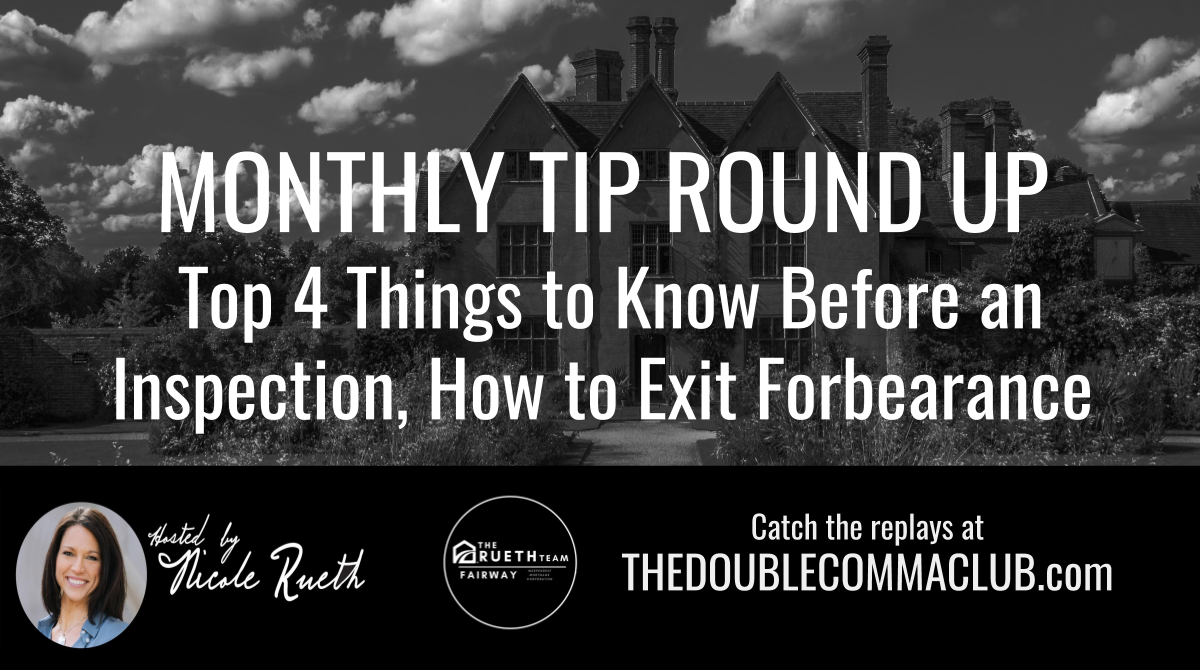Thursday Jan 28, 2021
Top 4 Things to Know Before an Inspection, How to Exit Forbearance

Listen to this 15-minute recap from January's tips: Why an inspector is a must, Top 4 Things to Know Before an Inspection, and Exiting Forbearance.
We've been talking a lot lately about buying your first investment. But what if you're a first-time homebuyer? One of the things that you're going to do right out of the gate when you get under contract is called a home inspector. And if you don't know one, you're probably going to get one from your real estate agent. But what does a home inspector do and why do you need one and why it might be different for inspecting a primary home versus an investment property with a different intention? I brought along Andrew Sams, who I absolutely adore, very well-respected, well-known here in the Denver Metro and up in Evergreen. And he wanted to talk a little bit about what you as a buyer could expect or should expect when you meet with an inspector. He does own Alpine Building Performance, in case you want to look him up. Andrew, what should a buyer be asking you, or what can they expect?
------------------------
What is a home inspection? What a home inspection is not? And then just that things are going to come up. This is for home buyers and agents. So if you've got a listing, prepare your sellers, that there will be things that come up on the inspection. Prepare your buyers, that there will be things that come up on the inspection and also let them know that you're there to provide solutions for them, I think that's really key. That you're going to be there to help walk them through whatever comes up but setting those correct expectations.
Secondly, Andrew talks about getting ahead of the ball. Sometimes surprises come up, which no one wants a surprise on either side of the transaction, but a lot of times we know of potential issues that will come up and it may be tempting on the listing side to hope those aren't always discovered in the inspection, but there's a lot of things such as a disclosed past issue with water leakage or moisture or structural issues.
His third point would be documentation. If you're a seller, provide all the documentation that you have on your home, that helps even if the buyer's not looking through it in detail. Have the full story of your home or property.
His final point is making sure that the home is ready for the home inspection.
--------------------------
Nicole Ruth: (10:07)
Possibly, you have your current home in forbearance and now you want to take advantage of these low-interest rates or move into that next home, but you're not quite sure what your options are. We haven't talked about forbearance in a while. It was all the rage back in April when the CARES Act allowed for it without any guidelines or rules around its execution. It was really clunky at first. People didn't know how to respond, lenders didn't know how to respond and the guidelines with FHA and Fannie Mae and Freddie Mac weren't established yet.
So everybody said, "Wait, don't get into it yet." And then eventually over time, they got the rules established and they actually ended up making sense. Now that you might be coming out of it, what does that look like? But if you didn't know, and if you do need to take advantage of forbearances, those deadlines have been extended by both FHFA and FHA. So definitely talk to a lender about that. They've been extended to March 31st for conventional and February 28th for FHA.
No comments yet. Be the first to say something!